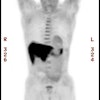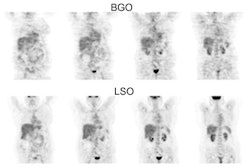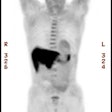Yen RF, Sun SS, Shen YY, Changlai SP, Kao A.
Although many cancers can be detected by whole-body positron emission tomography (PET) with 18F-fluoro-2-deoxyglucose (FDG), there has been limited clinical experience with FDG-PET for the detection of recurrent ovarian cancers. Therefore, the aim of this study was to evaluate the clinical value of FDG-PET in the detection of recurrent ovarian cancer. Whole body FDG-PET scans were performed on 24 women who had previous histories of ovarian cancer and treatment with surgery and chemotherapy. All patients also underwent physical examination, laboratory testing of serum CA-125 level and pelvic-abdominal-chest computed tomography (CT) or magnetic resonance imaging (MRI). The results of FDG-PET scans were correlated with serum CA-125 level, CT/MRI and operative pathology results. The diagnostic sensitivity was 90.9%, 90.9% and 90.9%, specificity was 92.3%, 76.9% and 46.2% and accuracy was 91.7%, 83.3% and 66.7% for FDG-PET, serum tumor marker of CA-125 level and CT/MRI in detecting recurrent ovarian cancer, respectively. FDG-PET is a useful diagnostic tool in detecting recurrent ovarian cancers with high specificity as compared with the serum tumor marker CA-125 level and the conventional CT/MRI morphological imaging methods.






